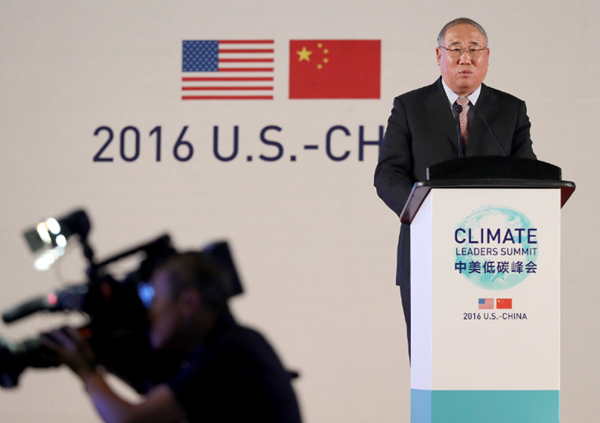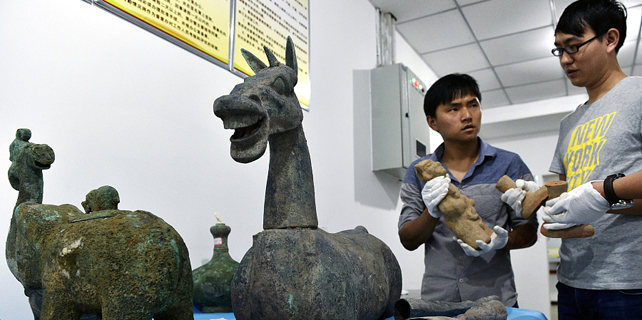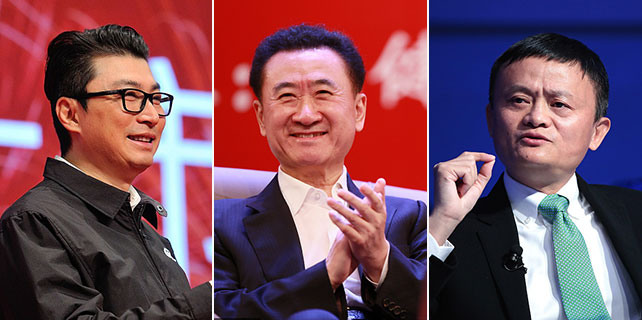The push for climate cooperation
 |
|
Xie Zhenhua, China's top climate change negotiator, speaks at the 2nd US-China Climate-Smart / Low-Carbon Cities Summit in Beijing on June 8, 2016. The major climate summit is scheduled to come to Boston in 2017. Chen Jianli / Xinhua |
President Donald Trump has yet to decide whether to keep the US in the Paris climate agreement, as many call for the US and China to continue cooperating on curbing global warming and increasing green development, Zhao Huanxin reports from Washington.
Despite the Trump administration being in limbo on agreeing to the Paris Agreement on climate change, researchers and officials say that the world's two largest emitters of greenhouse gases should ramp up cooperation in green development and curbing global warming.
US President Donald Trump won't make an announcement regarding the agreement until after he returns from the G7 meeting in Sicily that ends on May 27, White House spokesman Sean Spicer said.
As the future of the landmark Paris climate accord hangs on the US decision, former US president Barack Obama broke his silence. "It's important that big countries that are big emitters like the US and China... lead the way," Agence France Press quoted Obama on May 9 as telling a conference in Milan. He added that developing countries were watching the two nations and that they had to lead the way in the fight against climate change.
The world can't solve climate change without both countries' leadership, said Barbara Finamore, Asia director and founder of the China program at the Natural Resources Defense Council in New York.
"Cooperation on climate change between China and the US has been so constructive for so many years, it really has formed the cornerstone of the relationship between the two countries," Finamore told China Daily.
The US vowed to cut carbon emissions by 26 to 28 percent below its 2005 level by 2025, and China promised to reduce carbon intensity by 40 to 45 percent by 2020 compared with 2005, reaching its peak of carbon emissions by 2030 or even earlier.
Bridging the gap
The joint pledges helped bridge the gap between developed and developing countries and spurred momentum for nearly 200 countries and regions to join the historic climate agreement in late 2015, according to Finamore.
"In turn, the Paris Agreement provides the framework for continued cooperation between the US and China," she said.
In Beijing, Xie Zhenhua, China's top climate change negotiator, said that the country is ready to work with the US in dealing with global warming and pushing forward green development.
Changes in US domestic poliacies would most likely affect the realization of its nationally determined contribution (NDC) goal and were a major concern of the world, Xie said at a media briefing following a ministerial meeting of the "BASIC" bloc of four major emerging economies — Brazil, South Africa, India and China — on April 12 in Beijing.
The Clean Power Plan and other actions by the Obama administration had a 26 to 28 percent emissions cut in mind, according to Xie. However, in March, Trump signed an executive order that triggered a review aimed at killing the Clean Power Plan.
Xie noted that the US external policies regarding climate change have not yet been finalized
"To actively adapt and react to climate change is an action responsible to all mankind, and green, low-carbon growth is conducive to global sustainable development," China's chief climate envoy said. "It is a prevailing trend that no country will run counter to."
China, as one of the BASIC group which was formed in 2009, is willing to work closer with the US to push forward the process, he said.
Xie said that he expected China and the US to hold talks on climate issues, and, according to a Reuters report, discussions are ongoing at multiple levels.
Liu Jieyi, China's top envoy to the United Nations, also said China would work with the rest of the international community to implement the Paris Agreement, and turn the challenge of climate change into the opportunity of transforming to green and low-carbon development so as to realize sustainable development.
Barbara Thompson, South Africa's deputy minister of environmental affairs, said that as the position of the US on the Paris pact was unclear, the BASIC bloc's firm position on addressing climate change and their staunch support for the multilateral process might influence the US.
A policy recommendation report by the Asia Society, the Center on US-China Relations and the University of California San Diego submitted to the Trump administration in February also urged the president to sustain and broaden US-China collaboration on global climate change.
"Energy, climate, and environmental cooperation have been one of the most successful and necessary areas of US-China relations," noted the report by a task force chaired by Orville Schell and Susan Shirk.
Finamore of the Natural Resources Defense Council said she hoped that Trump would come to recognize the value to the US of continuing its constructive engagement with China on climate change issues, especially clean energy.
Working together
The two countries have had decades of cooperation in the energy sector, she said, noting that there is a whole range of issues that both countries can work together to solve: developing new technology for battery storage, sharing information, best practices and policies and figuring out how to make the economic transition to the energy of the 21st century.
Finamore also said Trump's concern that the Paris Agreement would give China an unfair advantage over the US in manufacturing was "groundless".
"China is moving away from heavy industry as fast as it can to make a long-term transition towards a low carbon, service-based economy," she said in an article written with Alvin Lin.
"China is shutting down excess industrial capacity and working to reduce CO2 emissions in the iron and steel, chemical, and building materials industries … The country's overall 2020 target for industry is to decrease CO2 emissions per unit of industrial value added by 22 percent below 2015 levels," the article said.
On April 18, the White House abruptly postponed a scheduled meeting to discuss whether the US would stay or pull out of the Paris Agreement, and on May 9 it again put off the meeting.
"I'd hope that this is a positive sign that President Trump is starting to listen to the will of the American people, because … seven out of 10 Americans want the US to remain in the Paris Agreement," Finamore said, citing a nationally representative survey – Climate Change in the American Mind.
Polls support agreement
The survey, conducted by the Yale Program on Climate Change Communication and the George Mason University Center for Climate Change in December, also found only 13 percent of respondents said the US should not stick with the deal.
A Quinnipiac University poll in early April found that 62 percent of respondents said Trump shouldn't remove specific regulations intended to combat climate change.
Despite Trump's hardline pre-election rhetoric against the deal, his inner circle has been tasked with providing him with a range of policy options, according
to media reports.
"Foes of the Paris climate agreement have gained the upper hand in the ongoing debate at the White House over whether the United States should pull out of the historic pact, although President Trump has yet to make a final decision, according to participants in the discussions and those briefed on the deliberations,'' The Washington Post reported on May 3.
On May 4, several Cabinet members met with top White House advisers, including Chief of Staff Reince Priebus and Trump's daughter Ivanka and her husband, Jared Kushner, both of whom support the pact. Also attending were Environmental Protection Agency Administrator Scott Pruitt, who has called for exiting the accord; Energy Secretary Rick Perry, who wants it renegotiated; and Secretary of State Rex Tillerson, who advocates remaining a party to it.
"I'm not going to say I'm going to go tell the president of the United States, ‘Let's just walk away from the Paris accord,'" Perry said at the Bloomberg New Energy Finance conference in New York late last month.
"But what I am going to say is, I think we probably need to renegotiate it," he said, according to an AFP report." We need to sit down and they need to get serious about it."
Jason Schwartz, media officer of the Greenpeace USA, said the world is turning away from fossil fuels toward renewable energy. "Until last November the US was right there with China in leading this global movement," he said.
Even if Trump decides to leave the Paris agreement, it would take four years for the US to officially drop out of the agreement, because of the pact's structure, according to Schwartz.
"We are heartened by the rest of the world's ambitions, and we hope that the world's major economies are able to compensate, with respect to reducing carbon emissions, for what the US is sure to add during Trump's presidency," he told China Daily in an email.
Contact the writer at huanxinzhao@chinadailyusa.com
















